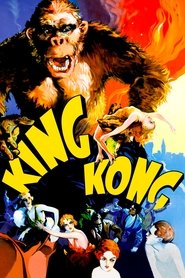Years later in 1962, Merian C. Cooper found out that RKO was licensing the character through John Beck to Toho studios in Japan for a film project called Il trionfo di King Kong (1963). Cooper had assumed his rights were unassailable and was bitterly opposed to the project. In 1963 he filed a lawsuit to enjoin distribution of the movie against John Beck, as well as Toho and Universal (the film's U.S. copyright holder). Cooper discovered that RKO also had profited from licensed products featuring the King Kong character such as model kits produced by Aurora Plastics Corporation. Cooper's executive assistant, Charles B. Fitzsimons, stated that these companies should be negotiating through him and Cooper for such licensed products and not RKO. In a letter to Robert Bendick, Cooper stated, "My hassle is about King Kong. I created the character long before I came to RKO and have always believed I retained subsequent picture rights and other rights. I sold to RKO the right to make the one original picture King Kong and also, later, Son of Kong, but that was all." Cooper and his legal team offered up various documents to bolster the case that Cooper owned King Kong and had only licensed the character to RKO for two films, rather than selling him outright. Many people vouched for Cooper's claims, including David O. Selznick, who had written a letter to Mr. A. Loewenthal of the Famous Artists Syndicate in Chicago in 1932 stating (in regard to Kong), "The rights of this are owned by Mr. Merian C. Cooper." But Cooper had lost key documents through the years (He discovered these papers were missing after he returned from his World War II military service.), such as a key informal, yet binding, letter from Mr. Ayelsworth (the then-president of the RKO Studio Corp.) and a formal binding letter from Mr. B. B. Kahane (the current president of RKO Studio Corp.) confirming that Cooper had only licensed the rights to the character for the two RKO pictures and nothing more. Without these letters, it seemed Cooper's rights were relegated to the Lovelace novelization that he had copyrighted (he was able to make a deal for a Bantam Books paperback reprint and a Gold Key comic adaptation of the novel, but that was all that he could do). Cooper's lawyer had received a letter from Beck's lawyer, Gordon E. Youngman, that stated, "For the sake of the record, I wish to state that I am not in negotiation with you or Mr. Cooper or anyone else to define Mr. Cooper's rights in respect of King Kong. His rights are well defined, and they are non-existent, except for certain limited publication rights." In a letter addressed to Douglas Burden, Cooper lamented, "It seems my hassle over King Kong is destined to be a protracted one. They'd make me sorry I ever invented the beast, if I weren't so fond of him! Makes me feel like Macbeth: "Bloody instructions which being taught return to plague the inventor."
Scritto da il
05-03-2025 alle ore 07:23
Immagini
Nessun dato in archivio
Consiglia
Voto
Nessun dato in archivio
Commenti
Nessun dato in archivio
Film
Nessun dato in archivio
